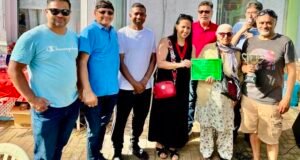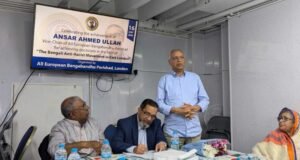
Six current students and recent graduates of the University of East London trained as English for Speakers of Other Languages (ESOL) teachers. As part of their training they helped to deliver free ESOL courses to local residents.
This was a great opportunity for the University to engage with the local community by enabling non-native speakers to increase their skills and confidence in English.
The doors of the Stratford campus were thrown open to host a four week summer school in English for over 50 east London residents who hail from a variety of countries including Spain, Romania, Vietnam, Bangladesh, Pakistan, Iran, Greece, Sudan and Eritrea.
Aged from 17 to 60, this very diverse group of residents came together to improve their English speaking, writing and listening skills. Many of the residents came from Newham, Barking & Dagenham, Stratford, Maryland and Forest Gate.
Some of the youngest participants are refugees and currently reside in foster care. Many of the residents wanted to do the course to improve their daily lives by communicating better, improve their job prospects or just to meet new people.
Elena Nemtanu, who comes from Romania and works as a cleaner, said, “I loved the course and the teachers were very good. I am glad that there will be some more classes on Thursdays soon.”
Another resident, Baksho Pall, commented, “I was nervous at first but the teachers encouraged me and gave me support. I will be coming back to the University in October to look into a course called New Beginnings.”
The University was given funding by the Office for Students (OfS) to deliver this training to its students and graduates. Together the OfS and the University are actively working to widen educational opportunities in east London for everyone.
The six students and recent graduates embarked on the ESOL course as it fitted in with their studies and career aspirations. Their courses covered international development, sociology, and youth and community studies. Three of the students, who recently graduated, are continuing their journey with the University by enrolling on its PGCE course starting in the autumn.
Billy Tapsell-McAvoy, who recently graduated from the University said, “I am really grateful to have this opportunity as I start the PGCE in September at the University of East London and this will give me a head start in teaching experience.
“There are many refugees and non-native speakers in London, especially in east London, and so this will prepare me for teaching students whose first language isn’t English. It has been an eye-opening experience for me.”
Iram Ali, who has also just graduated and will be undertaking the PGCE at the University, said, “It has been great to see the journey that the residents have taken over these few weeks. In the beginning they just stared at us and were really shy. Now they have opened up to us and are talking a lot more. It feels good to be able to give something back to the local community.
“I think that the course has also been useful for all six of us in building our confidence and developing as people.”
Richard Harty, acting head of school at the Cass School of Education and Communities, said, “This summer school has certainly helped the residents and University students and graduates build critical thinking skills and soft skills such as communication and teamwork and boosted confidence levels.”
This engagement with local communities does not end here though. In October the six students and graduates will be working with the Magpie Project as volunteer English teachers. The Magpie Project is an initiative based in Newham which supports mothers and under-fives in temporary or insecure accommodation. Many of the mothers are non-native speakers.
The students and graduates will deliver English lessons to the mothers to help them become more engaged in the community and to feel a sense of belonging. One of the key aims of this project will be to enable the women to improve their English skills and enhance their employability prospects to lift them out of poverty.
Andrea McMahon, co-head of teacher education, said, “The key outcome for this work with the Magpie Project is for the women to increase their confidence and build their life skills. The University of East London is committed to building bridges with the local community with the aim of enriching their lives. One day these women could be students at the University.”
Jane Williams, founder CEO of the Magpie Project, said, “We are over the moon to be able to work with the University of East London to bring ESOL to our mums. It is difficult enough trying to scramble out of poverty and stand up for your entitlements but without the words to make your case it is nearly impossible. These classes will unlock so much power and potential in our mums.
“It is really special to work with the University of East London as it is our local university. We are so proud of the University’s commitment to the community and its determination to support social change.”
The work with the Magpie Project will start in October and run for about six to eight months.
 Weekly Bangla Mirror | Bangla Mirror, Bangladeshi news in UK, bangla mirror news
Weekly Bangla Mirror | Bangla Mirror, Bangladeshi news in UK, bangla mirror news






